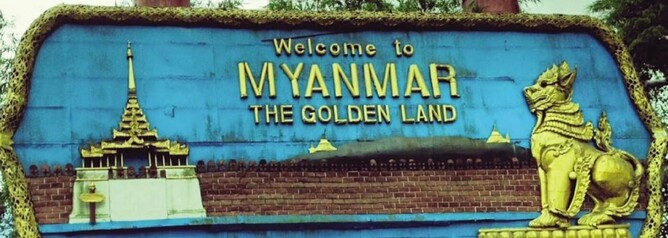Myanmar, once known as Burma, is a nation of 60 million people, bordered by six neighbours in South-East Asia. In area it is a little larger than Victoria. The Venetian adventurer Marco Polo came to Burma in the Thirteenth Century and called it the Golden Land. The name has stuck, reflecting Burma’s richness in natural resources and also because of the gold-clad Buddhist pagodas to be seen everywhere around the country, said to be over one million in number. ‘The Golden Land’ is also the title of a novel set in modern-day Myanmar by celebrated Australian author Di Morrissey. It is also a popular marketing slogan for the emerging tourism industry, judging by much of the advertising material we see.
Until independence in 1948, Burma was a province of British India. The leader of the struggle for independence was General Bogyoke Aung San — the ‘Mahatma Gandhi’ of Burma. The General, who was assassinated by a political rival at the age of just thirty-two, remains a national hero to this day. His daughter, Aung San Suu Kyi, two years old at the time of her father’s murder, was destined for fame also. Following a coup in 1962, the nation was ruled by a military junta for more than five decades. Pro-democracy champion Aung San Suu Kyi was held under house arrest for 15 years during this period when political dissent was suppressed. Despite winning several elections in landslides in the last decade, her National League for Democracy — the NLD — was not permitted to take the reins of government until just a year ago.
Myanmar is 90% Buddhist, though there is a significant Christian population in several states, reflecting the influence of servants of God like the American Baptist Adoniram Judson here the 1800s. Curiously, Myanmar has the third highest Baptist population of the nations of the world. Sadly nowadays, many are little more than nominal, though still proud to call themselves Baptists.
Transform the Nations Ltd (TtN) is a Non-Governmental Organisation (NGO) based in Australia and New Zealand, and working with local entities in several Asian nations to advance the Lord’s work through education and training, community development, and rescue and relief. TtN's International Director is Grahame Kerr from Hope Community Church, Nambour. Grahame and his wife Robyn have been pioneers of the ministry here, and still visit several times a year to explore opportunities and oversee projects in various parts of the country. Teacher training in Yangon and various provincial centres commenced in 2014 with TtN personnel from ‘down under’ assisting local groups of believers seeking to commence and operate Christian schools, training centres and associated ministries. OMF and the Korean Presbyterians are partners with Transform the Nations in the Promise Project.
David and Stacie Coates, who are both TtN directors, took early retirement from their service with the Christian Community Ministries (CCM) schools in Australia to relocate to Yangon in January 2016. (Yangon was once known as Rangoon, and is a bustling Asian city of seven million people, serving as the nation’s commercial capital.) In August 2016, ‘Promise – An International School’ (PAIS) commenced at Shwe Pyi Thar in the outer north of Yangon, to serve the schooling needs of international families, including expatriate Burmese families returning to their homeland to pursue the new opportunities that have come with the civilian government. The school premises have been donated by the expatriate Korean community, and these have been renovated and modified — through gift and loan funds, mostly from Australia — to house the school. PAIS has recently been fully accredited as a Cambridge International School, which will mean its students can sit the internationally recognized IGCSE and A/AS Level examinations. The primary years of schooling are based on the UK National Curriculum. There are currently ten Australians on staff, including Gordon and Ruth Harriott from Faith Community Church, Buderim (QLD), Kirsty Byrne from Village Avenue Community Church, Coopers Plains (QLD), and John and Jennifer Jenyns (family of Bruce and Angela). Other Australian expatriate staff members come from Melbourne, Adelaide and the Gold Coast. Burmese and Filipino Christians make up the balance of the staff at present.
Another important part of the Promise Project in Myanmar is the support of national schools, with up-skilling of teachers to teach more effectively and from a Christian worldview perspective; with assistance in planning and development of facilities; with the writing of policy and preparation of handbooks and manuals to meet registration requirements; and with technologies to modernise and improve the efficiency of their operation. A Steering Committee is currently working towards the establishment of a national Christian school to be known as ‘Promise School Mingaladon’. Here, too, a suitable property has been donated by locally-based Korean Christians. PSM will be a partner entity with PAIS, though it will offer a national curriculum in the Burmese medium with a strong emphasis on English as a second language. PSM will rely heavily on support from PAIS, especially in its early days. The Steering Committee is working towards and praying for a start to classes in June this year. The vision for the future is of a network of Promise Schools throughout the nation, some in English and others in the vernacular languages of the various states, and offering relevant and contemporary Christian education to equip the young to live for God in this emerging nation and well beyond. We will also accept children from the majority community as well. There is huge demand for quality schooling in modern Myanmar. The Mingaladon campus has space for us to build residential hostels for students and staff, and is located just 20 minutes’ drive from the PAIS campus in Shwe Pyi Thar. This will be of benefit to both schools, and serve families in provincial areas and even neighbouring countries who currently have no satisfactory access to such schooling for their children. Some expatriate families have their children in boarding schools in Thailand or India or have had to leave their children with relatives in their homeland to access suitable schooling.
Opportunities for service here are ‘golden’ also, in the sense that they are too good to be missed. But there are significant obstacles also. One is the difficulty in finding suitable teaching staff. PAIS provides health care, daily transport, and accommodation suitable for an individual, a couple or a family. It also meets visa expenses and provides a small living allowance. However, serving remains sacrificial. While staffers are encouraged to commit to serve for three years, short-termers and retirees can also fill important roles. Our expatriate staffers live in a centrally-located block of flats, with a Karen Christian couple serving in a concierge capacity and looking after the needs of the foreign teachers. English is not widely spoken here, its use having been discouraged during the junta years, so having a national couple on site to help with the daily business of living in a new country is a blessing for our staff. Support from home for our foreign staff is a bonus — especially prayer and pastoral support.
Funds to expand PAIS and establish PSM are also very scarce. PAIS has many enrolment enquiries, but cannot expand until funds are to hand to build a new classroom and specialist facilities block. A covered sports area is also a high priority as Yangon is a place of extreme weather. From February till May, conditions are extremely hot, with temperatures over 40 degrees for months on end before the arrival of the South West Monsoon — then it is very wet for the next five months. So a covered multi-purpose covered ball court is high on the ‘wish list’. Donations to help PAIS or PSM are tax-deductible in Australia, as are donations to our Burmese Pastors’ Bursary Fund. While Myanmar has one of the higher literacy levels in Asia, it remains one of the poorer countries in its region, though economic reforms are taking the country in the right direction.
We encourage Christian friends everywhere to pray for the land of Myanmar, and for the Lord’s work here. The early days of a civilian government have seen many positive changes, but significant challenges remain. Myanmar is a land of huge ethnic, religious and linguistic diversity. The great lady Aung San Suu Kyi is widely venerated, but the weight of expectations on her National League for Democracy party and her government is huge. On top of this, Suu Kyi herself is nearing 72 years of age. Her government includes many believers, including the country’s Vice President. Our local parliamentary representative, a Karen Christian lady and member of the NLD is a PAIS parent. The nation’s current leaders are daily in our prayers, as are its future leaders — our Promise students among them. We praise God for His faithfulness and provision to date and trust Him for all that lies ahead.
David and Stacie Coates served in the leadership of Clarence High School in Bangalore, India in the 1980s, and Hebron School, Ootacamund, India in the 1990s, commended by Queensland Assemblies to those ministries.
David and Stacie Coates
Yangon, Myanmar


